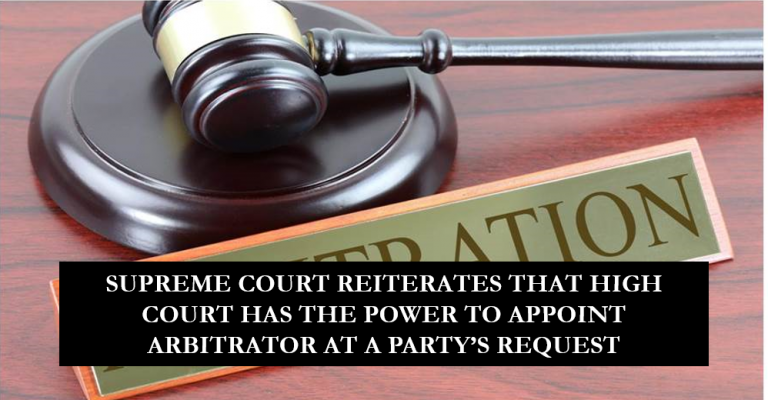SUPREME COURT REITERATES THAT HIGH COURT HAS THE POWER TO APPOINT ARBITRATOR AT A PARTY’S REQUEST
A Two Judge Bench of the Hon’ble #SupremeCourt of India of Justices Aniruddha Bose and M.R. Shah passed a Judgment dated 09-09-2021 in the case of Jaipur Zila Dugdh Utpadak Sahkari Sangh Limited & Ors. v. M/s Ajay Sales & Suppliers Special Leave Petition (Civil) No.13520 of 2021 and held that a #HighCourt can exercise the powers under Section 11 of the Arbitration and Conciliation Act, 1996 (Act) to appoint another #arbitrator in the event a person becomes ineligible to act as an arbitrator appointed under the #arbitration agreement.
In the present case, on 31-03-2015, the Respondent Firm (original Applicant) and Sahkari Sangh (Parties) entered into a Distributorship Agreement (Agreement) for a period of two years for the purpose of distribution of milk and butter milk in certain zones in Jaipur. Thereafter, disputes arose between the Parties. Clause 13 of the Agreement provided that all disputes and differences arising out of the Agreement shall be referred to a sole arbitrator, namely, the Chairman of Jaipur Zila Dugdh Utpadak Sahkari Sangh Ltd. (Arbitrator) and his decision shall be final and binding for the Parties.
On 19-10-2019, as per Clause 13 of the Agreement, the Respondent Firm approached the Arbitrator for settlement of a commercial dispute between the Parties. During the pendency of the Arbitration Proceedings, the Respondent Firm vide an Application approached the High Court of Judicature for Rajasthan (High Court) for appointment of an arbitrator under Section 11 of the Act and invoked the arbitration clause under the Agreement dated 31-03-2015. The said Application for appointment of arbitrator was opposed by the Petitioners. The main contention raised by the Petitioners was that it was not open for the Respondent Firm to approach the High Court for appointing an arbitrator under Section 11 of the Act as it had already approached the sole Arbitrator for resolution of the dispute and had participated in the Arbitration Proceedings. Section 11 (5) of the Act empowers the Supreme Court or the High Court or any person / institution designated by the Court to appoint an arbitrator, upon request made by the party.
The High Court while placing reliance on Section 12 (5) of the Act read with Seventh Schedule to the Act, allowed the said Application and appointed former District and Sessions Judge to act as an arbitrator.
Section 12 of the Act: Grounds for challenge is reproduced below:
(5) Notwithstanding any prior agreement to the contrary, any person whose relationship, with the parties or counsel or the subject-matter of the dispute, falls under any of the categories specified in the Seventh Schedule shall be ineligible to be appointed as an arbitrator:
Provided that parties may, subsequent to disputes having arisen between them, waive the applicability of this sub-section by an express agreement in writing.
The Seventh Schedule of the Act provides various categories of ‘Arbitrator’s relationship with the parties or counsel’. For instance, if the arbitrator is an employee, consultant, advisor or has any other past or present business relationship with a party, such a person is ineligible to be appointed as an arbitrator under Section 12 (5) of the Act.
Being aggrieved, the Petitioners approached the Hon’ble Supreme Court of India.
After taking into consideration, the arguments advanced by the Parties to the dispute and placing reliance on the case of Trf Ltd vs Energo Engineering Projects Ltd, (2017) 8 SCC 377, Bharat Broadband Network Limited vs United Telecoms Limited, (2019) 5 SCC 755 and Voestalpine Schienen GMBH vs. Delhi Metro Rail Corporation Limited, (2017) 4 SCC 665, the Apex Court observed that:
“Subsection (5) of Section 12 lays down that notwithstanding any prior agreement to the contrary, any person whose relationship with the parties or counsel or the subjectmatter of the dispute falls under any of the categories specified in the Seventh Schedule, he shall be ineligible to be appointed as an Arbitrator.”
The Bench observed that in facts and circumstances of the present case, the Chairman/sole Arbitrator can be said to be ‘ineligible’ to become an arbitrator as per Section 12 (5) read with Seventh Schedule to the Act as he was an elected member/Director of the Petitioner Sahkari Sangh.
The Supreme Court while dismissing the Special Leave Petition held that since the sole Arbitrator is ‘ineligible’ to act and continue as an arbitrator, the High Court committed no error in exercising its powers under Section 11 read with Section 14 of the Act and appointing the former District and Sessions Judge to act as an arbitrator.
Suchitra Upadhyay
Associate
The Indian Lawyer & Allied Services
Edited by
Sushila Ram Varma
The Indian Lawyer & Allied Services





































Leave a Reply